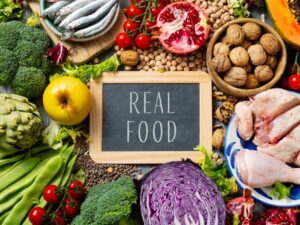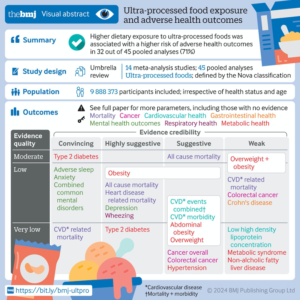Ultra-Processed Foods Linked to 32 Health Problems
Almost every month, new research about some aspect of health pops up that makes me realize the state of our health continues to worsen. A few weeks ago, we learned that the global obesity rate just crossed the billion person threshold. One in eight people globally now live with obesity.
This week I ran across some more alarming research. The British Medical Journal published a review of meta-analyses involving almost 10 million people that found a direct association between eating too many ultra-processed foods (fast food, chips, snack foods, and ready-to-eat meals that have been industrially manufactured with flavors and additives to make them more palatable) and 32 health conditions, including heart disease, anxiety and early death.
A team of international researchers conducted a comprehensive review of the evidence on adverse health to date examining 45 “pooled meta-analyses” from 14 review articles involving nearly 10 million people. All were published in the past three years, and none was funded by companies making ultra-processed foods. This was a big study in more ways than one.
- The researchers’ findings show that “diets high in ultra-processed foods may harm many systems of the body.”
- They found “convincing evidence” that linked higher ultra-processed food intake with about a 50% increased risk of cardiovascular disease-related death, a 40% to 53% higher risk of anxiety and common mental disorders, and a 12% higher risk of Type 2 diabetes.
- Evidence also associated diets high in ultra-processed foods with a 21% higher risk of death from any cause; a 40% to 66% higher risk of heart disease-related death, obesity, Type 2 diabetes and sleep problems; and a 22% higher risk of depression.
Ultra-processed foods, defined using the Nova classification system, encompasses a broad range of ready-to-eat products, including packaged snacks, frozen dinners, sugary cereals, potato chips, and even most breads. Ultra-processed foods are not merely modified foods. They typically contain little or no whole food and are made from cheap, chemically altered ingredients including modified starches, sugars, oils and fats.
Ultra-processed foods account for 58% of food consumption in the US. And an astounding 61% to 67% of what American kids eat is ultra-processed. Most of what we eat is junk. I don’t use that term loosely, because we’re talking about substances our bodies don’t recognize as food. And we’re feeding our kids even more junk than we eat. Maybe we are hoping our kids will adapt to junk food. They won’t.
Our bodies and minds are literally falling apart because of the amount of junk we eat.
- Diabetes or prediabetes affects 6% of the adult population in the US.
- The diabetes rate for people in the US over 65 years old is 48.8%.
- More than 20% of adults in the US suffer from mental illness.
- One person dies every 33 seconds from cardiovascular disease in the US.
- The most recent CDC data from 2017 tells us obesity afflicts 42% of adults and 20% of children in the US.
- More than 1 million kids suffer from ADHD. (Yep, ultra-processed foods play a role here too.)
All these conditions are caused by the foods we eat. Not how much, but what.
 The only way to save the health of our country—stop eating processed foods. We also need to push the government to ban many of the substances food manufacturers are allowed to use.
The only way to save the health of our country—stop eating processed foods. We also need to push the government to ban many of the substances food manufacturers are allowed to use.
The FDA determines what’s safe to eat and what isn’t. But are they really doing their job? In the 1960s the FDA placed brominated vegetable oil, an additive used in some citrus-flavored beverages, on it’s generally recognized as safe (GRAS) list. Now the FDA is considering banning this food additive because of its potential to cause central nervous system damage, headaches, nausea, memory loss, and loss of coordination.
Last year the state of California banned four common food additives linked to health problems. In addition to brominated vegetable oil, their ban included:
- Red dye no. 3 (erythrosine) – artificial food coloring used in some pink and red confections, baked goods, candies, frostings, cereals and beverages.
- Potassium bromate – used in some flours to make them rise better and impart lighter, fluffier texture.
- Propyl paraben – used in some baked goods as a preservative to reduce microbial growth and enhance shelf life.
The European Union has banned all these substances. The FDA still considers them safe.
I think it’s important to realize that many of us have consumed a lot of substances in ultra-processed foods that haven’t ever been proven safe. We don’t know how they affect our health. And there are so many of them that we don’t really know which ones do the most harm.
Things are getting so bad, and our health is getting so bad, that we need to do all we can to discourage the production and consumption of these “foods” that really aren’t food. The best place to start is with you.
- Start eating real food. Read the ingredients label of every food you consider eating. If the label includes any ingredients that you wouldn’t find or cook with in your home, it’s not real food. Don’t eat it.
- Be an example for others. Never shame your friends about what they eat. Simply make good choices when you are with others, and hopefully your example will lead them to ask questions or follow your lead.
- Do everything you can to support local producers of real food. If enough of us stop buying the ultra-processed stuff, the food industry will listen. They already are. They’ve begun producing more shelf-ready products with nothing but real food ingredients.
Let’s all do our part to stay away from ultra-processed foods and make America healthier. We live in a country where half the people over age 65 have diabetes. It doesn’t have to be that way.
Stay Strong,
Bo Railey


